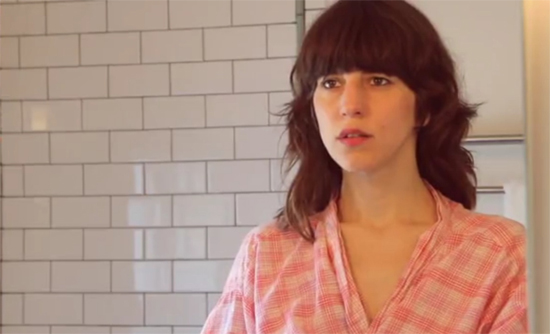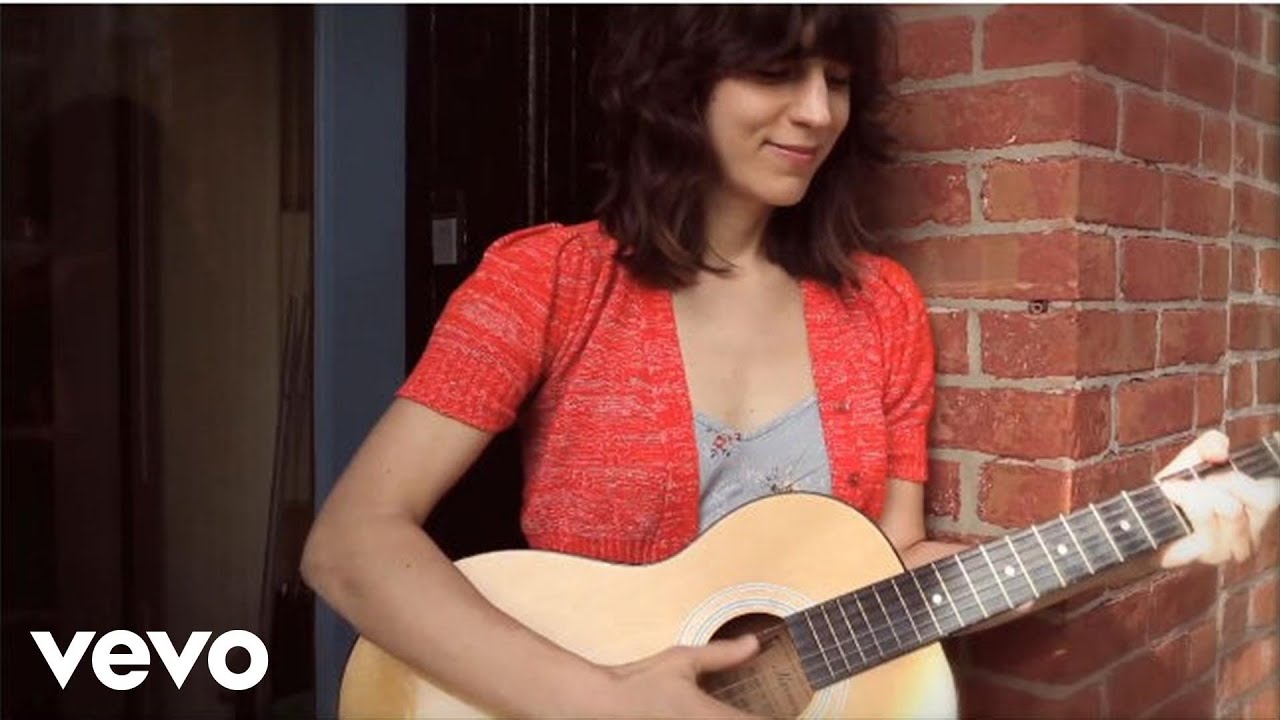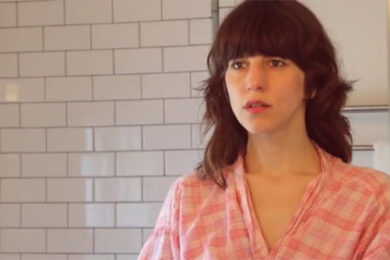New York-based Eleanor Friedberger has been gaining acclaim for her work in the Fiery Furnaces with her brother Matthew for years. Now she’s struck out on her own with her first solo recording, Last Summer, which is due for release on November 7th on Merge Records. And though she has no plans to leave the Furnaces behind, Friedberger is starting to enjoy the fruits of her labour. And well she should – Last Summer is an almost impossibly catchy album which retains the complexity of her band’s best work, but adds a warmth that makes it more accessible than the majority of the Furnaces’ music.
In advance of its release, and with Friedberger due to play London’s Platform Bar & Terrace next week (September 29th), we caught up with her to talk about how it came together.
I read that you didn’t show the album to anybody until it was done. Why did you decide to do that?
Eleanor Friedberger: That’s a good question. I don’t know. I didn’t give it to my family. I wanted to give them the actual physical record, I just thought it would be more real then. I didn’t want to give mp3 or rough mixes to people. When you’re making a record it goes through so many unfinished phases. I really wanted it to be final in some way. I wanted it to be done in a bubble or cloud. I didn’t want to hear anybody’s feedback so much. Not to sound too precious about it, but I wanted it to be as pure as possible. For a long time, the only people who heard it were Eric, the producer, and the people who played on it. Well, even they hadn’t heard the final mixes. Then I started sending out songs to different record labels, so I guess those people heard it.
Aside from making it alone, how did you approach making Last Summer differently from the way you approach making Fiery Furnaces records?
EF: The alone part is a pretty big part of it, in terms of it being different. There were a few different things I did. This was not like I had some songs lying around and decided to stick them on a record. I said, "I want to make a solo record." And then I sat down and wrote the songs for it, and I basically had a long script. I don’t know if it’s fair to call it a script, but that’s what it felt like–just ideas for lyrics and stories that I thought I could turn into lyrics, and I just kind of cut it up. And on three different songs, it was something I’d never done before. From these notes that I had, I improvised the vocals, which is something I wouldn’t have tried with my brother.
Your vocal phrasing is quite unique, it feels like you fit more words into a line than most singers. Are there vocalists you listen to who do that as well? Did you train your vocal phrasing?
EF: I don’t know. The first person that comes to mind is Van Morrison, who I grew up listening to. He’ll have a line but he’ll also fill in the space with sounds that are like ‘ooh’s or ‘ahh’s or grunts or something, and I like that. He’s somebody that I really subconsciously or consciously try to copy, I think. I’ve listened to a lot of Brazilian music, which I can’t understand, but I feel like I’m sort of trying to mimic now. Because I can’t understand the words, it’s more about how the words sound. On a lot of the songs on Last Summer the words don’t even rhyme, it’s just more about how they sound together. So maybe that is some kind of influence, listening to a lot of Brazilian music.
Do you see there being an overall narrative on Last Summer?
EF: I don’t know about it as a whole piece. Obviously, it’s in New York and a lot of it is about a specific time in my life, [but] I don’t know if the narrative is particularly coherent. To me, it’s about memories, it’s about the way we remember things. It’s about jumping back and forth in time. I don’t think there’s a theme or anything, [but] I know there’s a story for every song. I like people to take away what they want.
Can you tell me more about ‘Inn of the Seventh Ray’?
EF: It’s a restaurant in Topaga Canyon. I haven’t been there. In Los Angeles last summer, when I was in the middle of writing songs for the album – I’d never spent time in LA except for on tour, so it was fun for me – I went for a week and hung out with a lot of different people. And three different people had told me about that restaurant as a place they thought I would like. I thought it made a great title for a song. Each verse is about a different friend who I hung out with in LA.
What about ‘Scenes from Bensonhurst’?
EF: I don’t want to give too much away. It’s about someone I know, something that happened to him. It is about being able to discover things about people in ways you never could before. It’s part of our reality now that I had to deal with in the past. And it’s not just me; anybody can look up anybody on the internet. It’s depressing.
There is an interesting story I was reading about the video for ‘My Mistakes’ and how you used footage from an old VHS you found.
EF: It was a video that my friend Beth Lieberman made when we were at college together at the University of Texas. She was in an art class, and she made a video and asked me to be in it, and I was. And we made it and completely forgot. She’s still one of my best friends. We found the tape some time last year, and we just thought it was hysterical and it wasn’t clear what I wanted to do with it. But when it came time to think about videos, and think about the record, I decided to use that for ‘My Mistakes’. So I transferred it, then it was my idea to kind of recreate those scenes. I thought it fit the tone of the song perfectly.
My friend Sara (who shot the new footage) and I were trying to decide how to end it. Is the climax the date, all this preparation just to make out with another guy or what? I do learn from my mistakes and I choose something else now, which is music. It’s corny, but I like the sentiment. People have been asking me who the other girl is. They don’t recognize me. It worked out perfectly because I still have the same dress that I had then, and there are a few other things, like I have the same Greek tourism poster, so I thought it was fun to go back and forth in time like that, which is what’s happening in the song too.
Speaking of Greece, I read that you grew up in the Greek Orthodox church. How much do you think that influenced who you are now?
EF: I grew up with my grandmother being the choir director at a Greek Orthodox church. I wouldn’t say that my family is particularly religious. It was more significant culturally than religious. The biggest influence was seeing my grandmother being onstage every Sunday. Well, we didn’t go every Sunday, much to my grandmother’s chagrin, but when we did go, she was very powerful, and she had the loudest voice. She took her job very seriously. And I can’t help but think that had a big influence on me as a kid, even not processing it very much or talking to her about music. Just seeing her in that role was empowering.
Have you ever faced pressure to be more of a musical conformist than you are now?
EF: I want to say no. You want to make stuff that you like, and if other people like it, that’s an added bonus. It’s hard to not think about how to please people. That’s essentially what business is doing. It’s harder to think of myself as an artist at this time than an entertainer, even though I’ve never been in a pop band. It’s hard to straddle both things. But, no, I don’t feel the pressure. I just try to do things that I hope people like too. I’ve been lucky so far. I’ve never had any kind of commercial pressure put on me. I can do as much or as little as I want.
You’re working with Merge for the solo project, and you’re still with Thrill Jockey for Fiery Furnaces. Is there a big difference between the labels?
EF: No, because I made the record on my own, and I paid for it myself, and then I shopped it around. I think Merge sold more records, but I’m happy to be on both labels.
Who are your favorite writers?
EF: It’s funny. I have a stack of books to read right now that I haven’t read at all. It’s really embarrassing. Someone gave me a book of Flannery O’Connor short stories to read. My favorite poet – I just got into this woman Helen Adams. She’s a Scottish woman, but she lives in San Francisco and New York. I’ve always loved Iris Murdoch.
Last Summer is released through Merge on November 7th. Eleanor Friedberger plays Platform Bar & Terrace, London, on September 29th.




